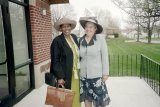A Message from Galilee
For some time now I have had it in mind to write about my church back in Indiana. In the photo my friend Joanna and I are in front of Galilee on the last Easter Sunday before I left Indiana.
 She often wore hats to church and sometimes I managed although I never had quite the diva attitude that she did. Today when I got a bulletin from Galilee in the mail, I knew it was time to put some of those experiences into words.
She often wore hats to church and sometimes I managed although I never had quite the diva attitude that she did. Today when I got a bulletin from Galilee in the mail, I knew it was time to put some of those experiences into words.I came to the church to do research for my thesis in linguistics. A little like the man who came to dinner, I left 7 years later. I did finally manage to get the thesis written with an enormous amount of help from more people than I could acknowledge even in an Oscar-length speech. Along the way, Joanna and I became friends, I got baptized, and I learned how to accept being loved without question. In retrospect, it was a very busy 7 years.
Occasionally there was another white person in the congregation, but usually I was the only one. I was certainly the only one who knew so little about the bible that even after some time, I relied on the alphabetical list to find the text for the service. The first time I heard the pastor say, "The doors of the church are open," I thought it meant the end of the service, and the only songs I knew were the songs everyone sang at Christmas. (For my British readers, there are big gaps between life in the States for black and white Americans, and these gaps are often most apparent on Sunday mornings. Martin Luther King, Jr. called Sunday at 10am the "most segregated time" of all.)
I have never been fond of early mornings, so the 5am Christmas service was always a struggle for me. I lived nearly an hour's drive away from the church, so I was up at 3:30 to get to church on time. One of the best Christmas presents I ever received was the day I got to church early and only Deacon Glover and his daughter were there. She was not a regular attender, so she had asked her father who that white woman was. Deacon Glover told me later, "I said 'that's no white woman, that's our Sister Sharon.'"
I was welcomed into the neighborhood around the church as well as the church itself. Joanna's mother took me into her home and sat me down around her kitchen table as if she had been waiting for me. Her gift of hospitality and that of Deacon Glover and the other members of Galilee helped pave the way for my coming here. My visits to Galilee were an initiation into being an other, an outsider. Because they took me in, ironically, it made it easier to leave.
When I think of speaking truth to power or moral authority or courage that comes only from a faith forged through hard times, I think of some of the women in Galilee. I include my friend Joanna in that group, but I believe that she and I share an admiration and a hope to grow up to be like Miss Mattie or Miss Gloria or Miss Margaret. Miss Mattie is nearly ninety now and still sitting in the front pew on the right hand side of the church on the days her health allows it. I was surprised one day when she stood next to me to discover that she scarcely reached my shoulder. She packs an incredible life force into a small frame. She delivered a sermon on Women's Day in the church and managed to rock the pulpit with the force of her delivery despite her tiny, seemingly frail frame.
Now in her eighties, Miss Gloria sings in the senior choir and wears higher heels than I do. One Sunday she told Joanna and me that she had baked cookies for us, so be sure not to leave church without getting them. We both forgot and in a few moments Miss Gloria arrived at Joanna's mother's house with the cookies and a severe tongue lashing for the two of us for being so forgetful. I never forgot anything she said to me after that day.
Miss Margaret is the widow of a Tuskegee airman and the first Black woman to head the Republican party in Indiana. She wore leopard print shoes and at 80 decided to buy herself a corvette which she struggled to keep within the speed limit.
We need that kind of moral authority and practical wisdom right now for the cease fire in Lebanon. We need the international equivalent of a church lady to turn to the squabbling pair and remind them of their better selves.
"Stop it right now. I don't care who started it. You both know better."
But the moral authority to say that and be listened to comes from a place that few politicians really visit. I don't mean just the church on the corner, but the faith that underlies it.


1 Comments:
Oh, diva girl. I am glad I'm not forgotten. I miss you, too. When are you coming over here? We can walk and talk literally until the cows come home.
Post a Comment
<< Home